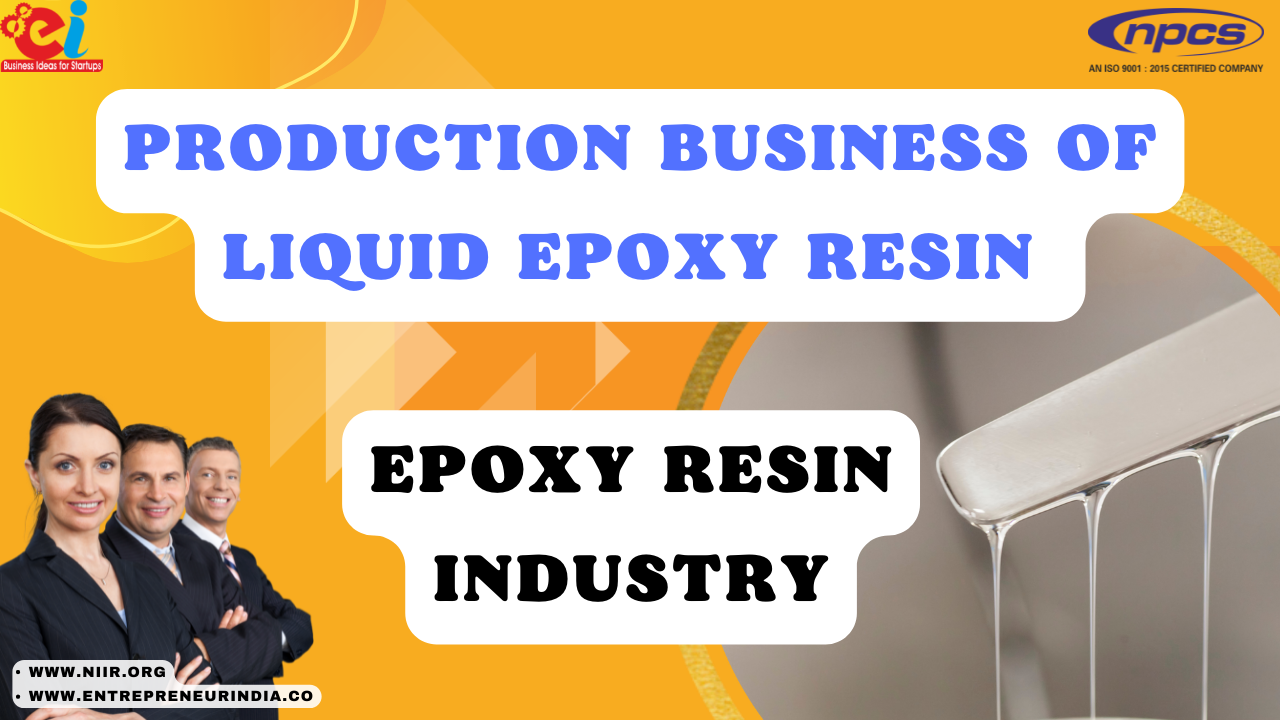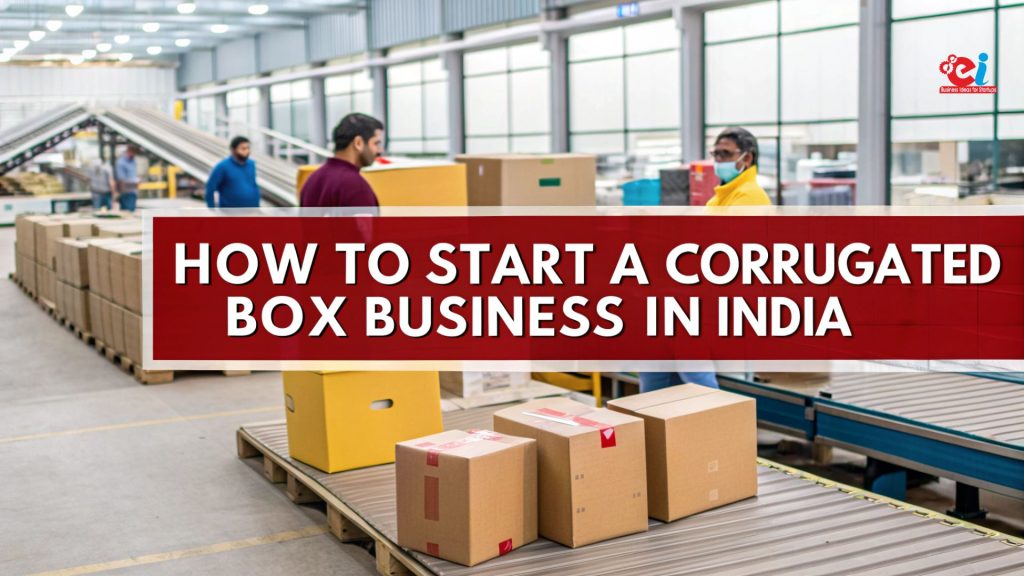
The production business of liquid epoxy resin is gaining immense traction in the industrial chemical segment due to the widespread use of epoxy-based materials in adhesives, coatings, flooring, electrical systems, automotive, and composite manufacturing. Liquid epoxy resin, known for its exceptional strength, durability, chemical resistance, and bonding properties, has become a key ingredient in several high-growth industries. As global demand for lightweight materials and high-performance coatings increases, setting up a liquid epoxy resin production business can be a highly profitable venture for chemical manufacturers and new entrepreneurs with technical and industrial capabilities.
Visit this Page for More Information: Start a Business in Epoxy Resin Industry
Market Potential and Applications
The demand for epoxy resins has surged across sectors such as electronics, construction, marine, aerospace, and renewable energy. A well-planned production business of liquid epoxy resin can supply high-quality resins to paint manufacturers, printed circuit board makers, automotive component producers, and flooring solution providers. The market is witnessing consistent growth due to the increased adoption of resin-based paints and corrosion-resistant coatings. Epoxy resins are also replacing traditional materials in wind turbine blades, electric vehicle (EV) batteries, and structural composites.
Read our Book Here: Epoxy Resins Technology Handbook
In construction, liquid epoxy resin is used in concrete bonding, waterproofing, and floor coatings. In electronics, it’s critical in encapsulating semiconductors and PCBs. This wide range of applications makes the production business of liquid epoxy resin resilient against market fluctuations, with scope for scaling and diversification.
Read Similar Articles: Resins Industry
Raw Materials and Chemistry
The primary raw materials for the production business of liquid epoxy resin are epichlorohydrin (ECH) and bisphenol-A (BPA). These are reacted through a condensation reaction in the presence of a base like sodium hydroxide to produce bisphenol-A-based epoxy resins, which can be further modified for different viscosities and thermal properties. Some variants also use novolac or aliphatic modifiers for specific performance needs.
Sourcing raw materials of consistent purity is critical to ensure product quality. Many manufacturers also add reactive diluents, flexibilizers, or hardeners depending on the target use. As the production involves exothermic reactions and precise temperature control, setting up proper safety and quality protocols is essential.
Watch other Informative Videos: Profitable Projects on Paints
Plant Setup and Machinery Requirements
To start the production business of liquid epoxy resin, one requires a well-equipped chemical manufacturing plant with provisions for handling hazardous and flammable chemicals. Key machinery and equipment include:
-
Stainless steel or glass-lined reactors with temperature and pressure control
-
Condensers and reflux units
-
Storage tanks for raw materials and finished resin
-
Vacuum pumps, filters, and dosing systems
-
Cooling and heating systems
-
Automated packaging units (barrels, drums, or bulk tanks)
-
Fume scrubbers and fire safety systems
Depending on the production scale, a 500–1000 sq. m industrial unit may be needed with appropriate zoning and environmental clearance.
Manufacturing Process Overview
The production business of liquid epoxy resin typically follows a batch-wise or continuous manufacturing method. The general process includes:
-
Charging the reactor with bisphenol-A and epichlorohydrin
-
Initiating reaction with an alkaline catalyst (usually NaOH)
-
Controlling temperature to manage the exothermic reaction
-
Removing byproducts like water and salt
-
Filtering and vacuum stripping of unreacted ECH
-
Cooling, testing, and packing the resin into containers
Each batch undergoes stringent QC tests for viscosity, epoxide equivalent weight (EEW), color index, and reactivity. Proper formulation adjustments are made to cater to different industrial requirements.
Related Project: Epoxy Resin – Manufacturing Plant
Licensing, Safety, and Compliance
Since this is a chemical manufacturing unit, the production business of liquid epoxy resin must comply with local industrial, fire, and environmental laws. Key licenses and registrations include:
-
Factory license under the Factories Act
-
Consent to Establish and Consent to Operate from Pollution Control Board
-
Hazardous waste handling approval
-
MSME/Udyam Registration
-
GST Registration and Excise documentation
-
Worker safety and chemical handling training protocols
The factory must be equipped with fire extinguishers, eyewash stations, personal protective equipment (PPE), and well-defined safety signage. Hazardous chemical storage protocols must be in place for raw materials like ECH.
Branding and Packaging Strategy
In the production business of liquid epoxy resin, packaging is usually done in:
-
30 kg to 220 kg plastic or metal drums
-
Intermediate Bulk Containers (IBCs)
-
Bulk tankers (for industrial supply)
Branding plays a less visible role in B2B chemicals, but technical datasheets, product certifications (such as REACH or RoHS), and customer technical support become essential value additions. Having a dedicated sales and technical team helps build trust with industrial clients.
Marketing and Distribution Channels
The business is primarily B2B, so your production business of liquid epoxy resin should focus on:
-
Bulk buyers like paint manufacturers, composite manufacturers, adhesive companies
-
Distributors and chemical wholesalers
-
Industrial procurement portals like IndiaMART or TradeIndia
-
Direct sales through exhibitions, technical seminars, and online channels
-
Export markets via merchant exporters or direct shipping to Southeast Asia, the Middle East, or Europe
A technical brochure with TDS (technical data sheet) and MSDS (material safety data sheet) is crucial to gain industrial clients. Offering bulk discounts, credit terms, and custom formulations also boosts long-term partnerships.
Read our Books Here: Synthetic Resins
Cost Structure and Profit Margins
An indicative cost breakdown for starting a production business of liquid epoxy resin:
-
Plant setup and equipment: ?35–50 lakhs (for small to mid-scale plant)
-
Licensing and pollution compliance: ?3–5 lakhs
-
First batch raw material procurement: ?15–20 lakhs
-
Working capital for 3 months: ?10–15 lakhs
-
Packaging and logistics setup: ?5 lakhs
The manufacturing cost per kg of epoxy resin ranges from ?160 to ?200, depending on purity and formulation. Selling prices range from ?220 to ?350 per kg. With bulk production and consistent quality, profit margins can reach 20–30%, and breakeven may occur within 1.5 to 2 years.
Future Opportunities and Innovations
As industries evolve, epoxy resin formulations are being optimized for sustainability, low VOC emissions, and bio-based feedstocks. The production business of liquid epoxy resin can expand into:
-
Water-based epoxy systems
-
Bio-based resins using plant oils
-
High-temperature resins for aerospace
-
Epoxy nanocomposites for electronics
-
Custom adhesives for EV batteries and solar panels
Developing an in-house R&D lab or partnering with institutes can help you innovate and patent new products, enhancing brand value and export potential.
Conclusion
The production business of liquid epoxy resin is a technically rich and financially promising venture that aligns with the demands of modern industries. With growing applications in infrastructure, electronics, automotive, and green energy, epoxy resins continue to be in high demand. A successful business requires a balance of chemical expertise, quality control, compliance, and market positioning. Entrepreneurs who invest wisely in formulation, plant design, and industrial networking can build a scalable and sustainable epoxy manufacturing business that thrives in both domestic and global markets.
Related Feasibility Study Reports: Adhesives and Sealants
See More Links:
- Start a Business in Asia
- Related Market Research Reports
- Start a Business in Potential Countries for Doing Business
- Best Industry for Doing Business
- Business Ideas with Low, Medium & High Investment
- Looking for Most Demandable Business Ideas for Startups
- Start a Business in Africa
- Start a Business in India
- Start a Business in Middle East
- Related Videos
- Related Books
- Related Projects
For more details: https://bit.ly/3HDerDI
NIIR PROJECT CONSULTANCY SERVICES, DELHI
An ISO 9001:2015 Company
ENTREPRENEUR INDIA
106-E, Kamla Nagar, Opp. Mall ST,
New Delhi-110007, India.
Email: npcs.ei@gmail.com
Tel: +91-11-23843955, 23845654, 23845886
Mobile: +91-9097075054, 8800733955
Website: https://www.entrepreneurindia.co
https://www.niir.org





